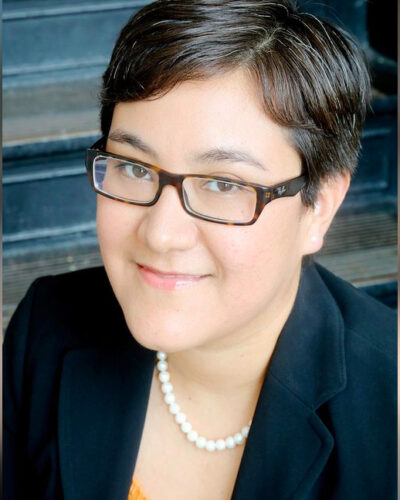Immigration lawyer Frances Valdez ’05 has spent the better part of two decades advocating for legal rights and the improvement of legal systems for low-income immigrants, first as a student in Texas Law’s Immigration Clinic and then with multiple prestigious non-profits, including Baker Ripley and United We Dream. She has served on numerous boards, including the ACLU of Texas, Avenue CDC, and the State Bar of Texas.

Photo: Pin Lim
Today, Valdez is the Executive Director of Houston in Action, an organization “working to increase the civic participation of Houston youth through… a culture of civic engagement (and) reduce barriers to political engagement for the Houston community at-large, especially those affecting marginalized communities.”
The work of Frances Valdez and Houston in Action has attracted national fans, including the Ford Foundation’s Sanjiv Rao and and Jerry Maldonado, who profiled Valdez and the group as part of a larger feature about “The Changing Face of Advocacy,” in which they profiled five organizations across the country, “grassroots organizations… creating a new face of advocacy that’s truly representative of modern America and producing powerful waves of change in their states.” The profile is part of the Ford Foundation’s #VanguardsOfJustice campaign.
We reprint, with permission, the relevant section of Rao and Maldonado’s article below, including the original artwork created by Cody Guilfoyle. The full article can be read on the Ford Foundation’s blog.
The Changing Face of Advocacy: Frances Valdez, Houston in Action
Graphic by Cody Guilfoyle
As the 2020 election approached, Frances Valdez, director of Houston in Action—a coalition of more than 50 member organizations working to increase civic participation—was thinking a lot about her great-grandmother. Valdez’s family still has the receipts from the poll tax she had to pay to cast her vote in the small border town by the Rio Grande where they lived. “The history of oppression and racism in this state is deep,” Valdez said.
To Valdez, there is a connection between the poll tax her ancestors had to pay to vote and other remnants of the Jim Crow era, and the efforts by Republican policymakers in 2020 to disenfranchise communities of color. Texas has long been a state where those in power have used the political and legal systems to suppress the representation of people of color. “During national elections, people from outside the state look at the numbers here and they’ll say ‘there’s an opportunity with all these people of color in Texas,’ so they’ll come down and try to organize and mobilize and do the same thing they do in other places to get votes,” Valdez said.
This approach, Valdez said, often fails because it misses the complexity of Texas and the diversity it contains. “Because of our history of oppression, individualism, and many other factors, Texas doesn’t have the same history or culture of organizing like what you might find in places on the east coast or in Detroit,” Valdez said. “Efforts of BIPOC communities coming together and saying: ‘We don’t like this, we’re going to build power and change things’, have historically been under-resourced and oftentimes quelled. This has made it hard to build a strong culture of organizing in this region”
Houston in Action’s main goal is to strengthen civic participation across Harris County—the third largest county in the US. What’s key, Valdez said, is understanding the nuances in the county’s diversity and meeting people where they are.
The 2020 census was the first opportunity for Houston in Action to test its approach. It cultivated a network that included clinics, libraries, community centers, places of worship and organizations with histories of strong organizing across Harris County’s diverse, undercounted communities. “We were able to build infrastructure to directly support and add capacity to community organizing and weave a network broader and more integrated than we’ve ever really seen in our region,” Valdez said. Roughly 200 entities engaged in the regional effort, many of which were trained and funded to educate their constituents about the census and encourage participation. “We saw the power of sharing data and systems across such a broad network and saw the results as our network evolved to take on 2020 voter registration and participation, and now to activate people around redistricting and potentially COVID-19 vaccine response.”
While national campaigns are hungry for numbers and votes, Houston in Action invests in organizations that work directly with historically marginalized and oppressed communities. “The reality is that the communities most at risk for a census undercount, the communities where there is less voter registration, these are people that have been intentionally left out due to systemic racism,” Valdez said. “And they are the ones who suffer most in a crisis, whether it’s a hurricane or COVID-19. People are trying to go to them for registration and votes, but right now, they’re dying.” By working with and directing funding to organizations already embedded in communities, Houston in Action is building a model by which civic participation can grow out of community bonds, rather than being shaped by outside forces.
This is long-term, essential work. “I’m sure some people may be afraid to invest in Texas again because the election didn’t go like they thought it would,” she said. “But what I tell people is that we can’t stop. Many Houston in Action members and partners have been working to build organizing power in Texas for years. We have to continue to invest in new organizations, innovations and experiments and we have to be open to 10- or 20-year plans to strengthen these bonds to build leadership and community-based power.
“We have to start from a place of working with all of our unique communities, helping them see and build what they want for themselves. That’s the foundation that participation can grow out of.”
Read the original Ford Foundation article by Sanjiv Rao and Jerry Maldonado.

